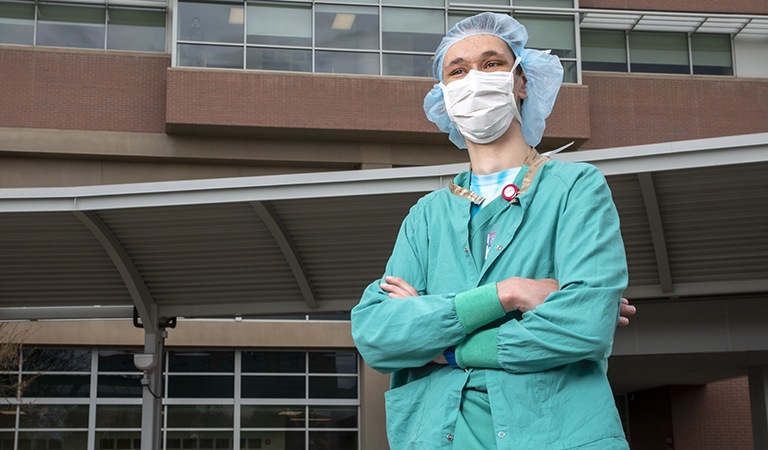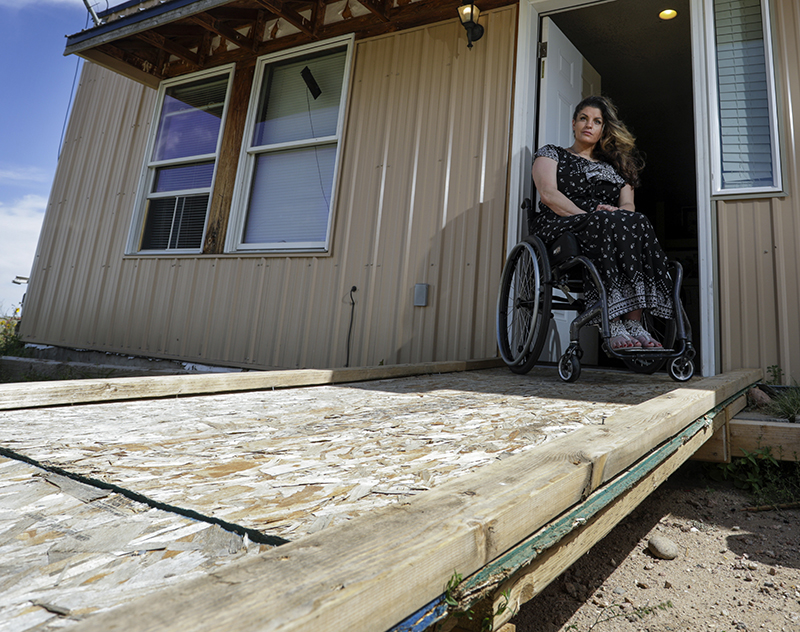
Bennett Lewis outside University of Colorado Hospital on May 15, 2020. Photos by Joe Mahoney / Special to The Colorado Trust
Bennett Lewis outside University of Colorado Hospital on May 15, 2020. Photos by Joe Mahoney / Special to The Colorado Trust
Take what you know about the complications and hurdles COVID-19 has thrown into most Colorado lives since March.
Then imagine navigating all that while living with a significant disability, and multiply what you were thinking by many times more.
The family of Bennett Lewis, 19, knows they have been fortunate to keep their developmentally delayed teenager working at his job prepping and cleaning operating rooms at UCHealth’s University of Colorado Hospital. For many people living with disabilities, “last hired, first fired” is the rule, yet Bennett has kept most shifts and even added some hours during some weeks of the pandemic.
That doesn’t mean it’s been easy for the family.
Bennett used to get to his five-hour shifts riding the R Line train. With hospital scheduling moved to just-in-time because of pandemic disruptions, and RTD cutting back service to account for both the plummet in passenger volume and need to socially distance on public transportation, Bennett needed a ride. For many like Bennett, maintaining a routine is key to disability adaptation.
Bennett’s mom, Johanna, is a Cherry Creek High School teacher, and her new remote-only schedule allowed her or Bennett’s brother to drive him to the hospital. (Bennett’s family speaks for him because his thought process and voice can be difficult for strangers to understand.) Once there, Bennett had to get used to a new building entrance and new disinfection regimes. Life skills and job skills coaches provided by Project Search, which trained him for his job, could no longer see him. His supervisor had to take over the routines, down to showing Bennett where the next-day hospital schedules were posted.
Back at home, Bennett has to peel off his clothes and put them straight in the washer, and immediately take a shower. And of course, the family worries quite a bit more about his health each day—particularly the moment at the dinner table when he announced he’d spent the afternoon cleaning up a room that had housed a COVID-19 patient.
“We all dropped our forks and said, ‘What?!’” Johanna said. Still, they would never tell him to stop going to work. “It’s really what he lives for,” his mom said. “He’s so proud of being able to have a quote-unquote normal life.”
Bennett’s family counts him among the lucky ones. Coloradans living with disabilities have been hit especially hard by the pandemic, whether in direct health effects for those living in nursing or other institutional settings, or the widespread economic fallout that hits a group already struggling to reach parity.
More than half the COVID-19 deaths in Colorado so far have come among the elderly—many living with disabilities—in nursing or assisted living facilities. After lagging far behind other groups gaining employment during the 10-year economic upswing, people with disabilities are too often the first to be let go for liability fears or economic reasons, advocates say.
New anxieties and shredding of routines felt by all hit even harder for people living with disabilities. Those who keep jobs find it harder to get to work, and lose out on home health visits by personal aides. Trips for food or medication are now hazardous or impossible. Deliveries don’t exist for those using electronic benefits cards. Those who get evicted from housing will find it harder than ever to land accessible homes in a market where less than 1% of the housing stock clears that bar.
The list of worries is long and troubling, said Julie Reiskin, executive director of the nonprofit Colorado Cross-Disability Coalition (a Colorado Trust grantee). For parents of children with severe disabilities now out of school, “people are expected to go back to the office, but their kids are still at home,” Reiskin said. “For families doing the caregiving, this is a very long time to go without any sort of break or respite.”
Unemployment alone is likely to be a crushing blow for the community, Reiskin said: “It’s always harder for people with disabilities to get jobs. Our employment numbers were bad even when employment was really full.”
The gap is enormous. Just 47% of Colorado adults with disabilities were employed in 2018, compared to 81% of people without disabilities, according to an annual Census analysis by the University of New Hampshire (UNH). Colorado is home to more than 600,000 people with disabilities. (Research on disability typically defines it as a physical or mental impairment that substantially limits one or more life activities.)
That contributes to a high rate of poverty as well, with 22% of Colorado adults with disabilities living at or below poverty levels, compared to 14% of the non-disabled population, according to the UNH analysis.
Families of and advocates for people living with disabilities say they must stay vigilant and proactive even if the working economy does rebound later and the state is no longer under strict lockdowns. State and local social-service budgets are already taking deep cuts because of pandemic-related revenue losses. The state legislature faces billions of dollars in deficits for the next fiscal year, and has begun considering painful choices on funding cuts to community living for nursing home patients, children’s health insurance, substance abuse treatment and wraparound services for people with severe disabilities, among other items.
Colorado Gov. Jared Polis launched an initial round of cuts for the last two months of the current fiscal year with pages of line-item trims in human services and health care.
“The executive orders with all those cuts are going to be a real challenge to make sure people are treated adequately, educated adequately, and have their mental health needs met,” said Alison Butler, an attorney and legal director for Disability Law Colorado.
Coloradans that require wheelchairs have seen many of their daily challenges compounded by the arrival of coronavirus and lockdown orders in the last two months.
Rachel Frey (whom The Colorado Trust profiled in the fall of 2019) has struggled to find steady, accessible housing in El Paso County since her 2018 accident. She had to leave an apartment in Calhan with her 12-year-old son just as the coronavirus took over Colorado life. Her doctor told Frey her immune system was too compromised to live in a temporary motel room, so they moved into an Airbnb rental at $700 a week—nearly as much as her entire Social Security payment in a month.
Frey suffered a urinary tract infection in December, leading to a heart attack. She appreciates the people who deliver groceries, and the school volunteers who bring her son sack lunches, but wonders if they wore masks and how careful they’ve been.

Rachel Frey outside her former home in Calhan, Colo. in September 2019. Frey has recently had to relocate with her son to an Airbnb rental while searching for new permanent housing during the COVID-19 pandemic.
Frey’s son will have to enroll at a new school district in the fall. Will the district hold classes? Will she have a permanent address when she has to register him? When state officials worried hospitals might fill up, she heard about the updated Colorado crisis standards of care—health care rationing protocols to be used if facilities are overwhelmed—and wondered how she would fare under them.
“If I needed to be on a ventilator, and there weren’t enough, they’d pick the person next to me,” Frey said. “That’s a harsh reality.” (Reiskin said CCDC is comfortable that under revised crisis standards of care in Colorado, people wouldn’t be denied life-saving care because of their disabilities.)
After sorting through dozens of apartment ads and finding that “accessible” was usually an exaggeration or a lie, Frey now is on a list for an interview for Colorado Springs public housing units. The only alternative she sees when her money runs out is for her to go to a nursing home and her son to go to foster care.
“I’m just holding out,” Frey said, in tears. “Please, Lord, let me make that appointment.”
Advocates who field inquiries from people living with disabilities said many of their phone calls in the first few weeks of the pandemic in Colorado involved worries about staying healthy, getting groceries and medication, or filing for unemployment. From experience in past economic downturns, they expect questions will now turn more toward disputes with landlords about rent and eviction, and with employers about furloughs or returning to work.
In the past, employers have used health concerns to let go workers with disabilities or health conditions that they judged to be a liability or burden, Butler said. With ongoing social distancing requirements in state and local COVID-19 orders, many employers plan to reopen with half or fewer workers in the same space.
“If they had 10 [employees] before and they only want five to come in, they may single out the person with a disability, so people who are wanting to work are passed over for younger and healthier people,” Butler said. Disability Law Colorado will advise people that the U.S. Supreme Court has ruled that to be unlawful: If the risk is only to the employee, then it’s up to the employee to assess that risk for themselves.
Advocates are also redoubling efforts to seek a congressional rule change requiring grocers to accept benefits over the phone or online for grocery delivery and pickup, Butler said.
As tragic as the COVID-19 nursing home deaths have been, Butler and Reiskin said, the headlines may help refocus efforts by advocacy groups to help anyone leave institutional care who can find other arrangements to live in the community. For decades now, advocacy groups have pushed government agencies to provide funding and staff to review every patient and pay for transition or home health services that promote independent living.
“We think there are still a lot of people who don’t need to be [institutionally housed],” Butler said. Still, some of those funds were among the first targets of state budget-cutters considering painful choices in the departments of Human Services and Health Care Policy and Financing: “We’re trying to get a sense of how much is left,” Butler said.
Disability service organizations have also seen their client activities severely curtailed by the COVID-19 response. Project Search, which had trained Bennett Lewis and every semester takes on eight to 10 young adults for job placement in health care or retail settings, saw many of its employer partners simply send trainees home. A few trainees progress to the point where they can live on their own, and some have had to move back in with families during the pandemic, said Project Search Executive Director Stephanie Crookston.
“It’s hard when there’s a very large group of people you have proven wrong, only to end up back home,” Crookston said.
What Project Search can do with its fall class is very much up in the air. New trainees come in through partner Jefferson County Public Schools, meaning both the source of students and the locations of employment have seen their plans torn up.
Bennett’s family is grateful to the UCHealth system for finding ways to keep him on the job. They are looking forward to when his life skills and job skills trainers can meet with Bennett again to work on everything from counting money to communicating with supervisors.
“We hope things settle down again so he can work towards that again,” Johanna Lewis said. “He doesn’t want to be in his 20s and still living at home.”